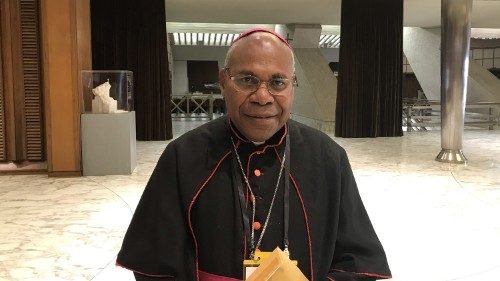Bishop Rochas Tatamai of Papua New Guinea talks to Vatican News about the different realities the Church in Papua New Guinea is facing.
By Francesca Merlo
Bishop Rochas Tatamai of Kavieng in Papua New Guinea is attending the Meeting in the Vatican on “the Protection of the Minors in the Church” and is one of the representatives of Oceania. He reacs to the discourse of Cardinal Cupich, stating that “in principle it is a good thing to have some concrete steps…from an American perspective”. This, he says, will help the Church in Papua New Guinea to “seriously and critically” analyse their own situation and apply the messages that they “may be able to learn from”. This, according to Bishop Tatamai, is one of the most important things that is happening here: “We are sharing resources, sharing ideas”.
Church in Papua New Guinea
But what exactly is the situation of the Church in Papua New Guinea?
Bishop Tatamai says that the Church in Papua New Guinea is “still a very ‘people-oriented’ Church”, and that its capacities “are not as complex as those in the European and American structures”.
That, he says, is “a big plus” – the fact that “we are a Church that is together with lay people.” In Papua New Guinea, the Bishop says, just as young people are, the lay people are involved, and when events are being organized, the Bishops, he says “always take into account the direct effect, the immediate effect, on the people.”Listen to Bishop Tatamai of Papua New Guinea
A maternal model
The people of the Church of Papua New Guinea’s, continues Bishop Tatamai, have been “very, very forgiving”, with regard to the issue of clerical sexual abuse. Forgiving, he specifies, “to us, the Church”. He believes that this is down to the fact that the people look up to priests and look up to the Church, seeing it as “a maternal model”.
The Church of Papua New Guinea, according to Bishop Tatamai “has been providing all the services”. It is the “bright light” of Papua New Guinea, he says.
Despite this, says the Bishop, the meeting so far has been an “eye-opener”. He explains that “we have to confront the reality that the media presents.” The other aspects that must be considered, he says, “regard the development of the Church so far”. Coming from a very young church “wakes everybody up to say ‘is this how far we can go?’ and ‘when maturity comes is this what happens?’”
Contributions
Bishop Tatamai concludes saying he wants to “build up” the Church’s capacities. During the meeting there has been much discussion on the inclusion of lay people in the Church and reiterates, “we already have the lay people with us”. And though in Papua New Guinea “we many not have the capacities or resources that others have around the world” he says “we can give our contribution”.



